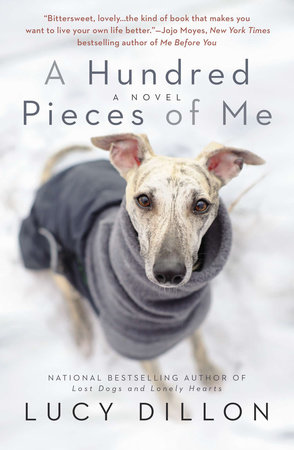READERS GUIDE
Questions and Topics for Discussion
INTRODUCTION
Gina Bellamy is reeling from her recent divorce. In need of a fresh start, she decides to jettison all her possessions—except for the one hundred things that mean the most to her. As she lets go of the past, Gina begins to come to terms with what has happened in her life and discovers that seizing the day is sometimes the only thing to do. And when one decides to do just that…magic happens.
ABOUT LUCY DILLONLucy Dillon is the national bestselling author of Lost Dogs and Lonely Hearts, Walking Back to Happiness, and The Secret of Happy Ever After. She lives in Herefordshire, England with her husband and a pair of basset hounds, Bonham and Violet.
DISCUSSION QUESTIONS- With each major life event, Gina expects her “new life” to start; when she gets married, when she gets divorced, and when she moves into her new apartment: “She tried to center herself: the white walls, the bold blue vase on the windowsill, the soft lamps, the hyacinth candle. Her place. Her new life.” Do you think, at the end, that Gina gets a “new life,” and an entirely fresh start? Or, does the possible return of her cancer indicate that she hasn’t fully escaped her past?
- If you could keep only one hundred things from your life, what kind of things would they be? What would they represent?
- The narration jumps around in time, as if the reader is unpacking with Gina and reliving memories with her. What effect does this have on you, as the reader? If the novel’s events had unfolded in chronological order, how would this have changed your interpretation?
- The novel often references karma, and everything evening out in the end. At her wedding, Gina says to Naomi, “Don’t you think that…sometimes the universe balances things out?…You know, we all get our share of good luck and bad luck, eventually.” Do you think that the book supports this theory of karma, especially considering how it ends?
- The three men in Gina’s life are very different, as “Nick was the man who made her want to do things…not show her, like Kit, or tell her, like Stuart.” Do you think, though, that she meets each man when she needs him the most, or is she meant to be with Nick all along?
- Gina loves old houses for their history and their ability to tell a story. However, at the end, she wants to go to her new apartment with Nick because “there’s nothing in my flat. No history. Just us.” How do you reconcile Gina’s love for old houses, filled with ghosts, with her love for her new, empty apartment?
- Stuart’s character evolves as the reader learns more about him and his relationship with Gina. In the end, do you think Stuart deserves his happy new life with Bryony?
- Toward the end of the novel, Gina is surprised to learn that she was a “reckless” child. She also earlier expresses that she hates having her picture taken, because she never looks like she does in her head. What are some of the differences in the way Gina sees herself versus how others see her? When defining our own personalities, how much weight do we need to give how other people perceive us?
- Throughout the novel, Gina tends to draw a firm line between childhood and adulthood, thinking she should recognize a “starting gate into proper adulthood.” When, do you think, “proper adulthood” begins? Is it something easily definable, like when you get married, or when you move into your own place?
- Why do you think Gina married Stuart? Was it because she felt pressure from her mother and Naomi, because she felt it was time to settle down, or for an entirely different reason? Further, do you think they ever truly loved each other?
- Gina and Janet are usually at each other’s throats. However, do you think they are more alike than different? Why or why not?
- Gina often imagines the different paths her life could have taken. At the Magistrate’s house, she wonders if “this was the house she and Kit would have had, if the version of her life in which she married him and had several blond and angelic children had happened.” Do you think that if the accident had never happened, Gina would have ended up with Kit?
- As she gives her things away to charity, Gina wonders if “they’d be constructing her personality from books she’s never got round to reading. From clothes she’d never found the right occasion for.” If all of your belongings were put in a box and given away, do you think the people unpacking it would be able to paint an accurate picture of your personality? How deep would it go?
- Gina feels incredibly guilty for “the accident.” To what extent do you think this guilt controls her life?
- Throughout her life, Gina collects objects that she attaches meanings to, “creating this paper trail of possessions.” By the end of the novel, Gina has abandoned her “a hundred pieces” project, replacing objects with experiences. Do you think that the novel is trying to convey that objects are worthless? Are some objects worth holding onto? Why or why not?

